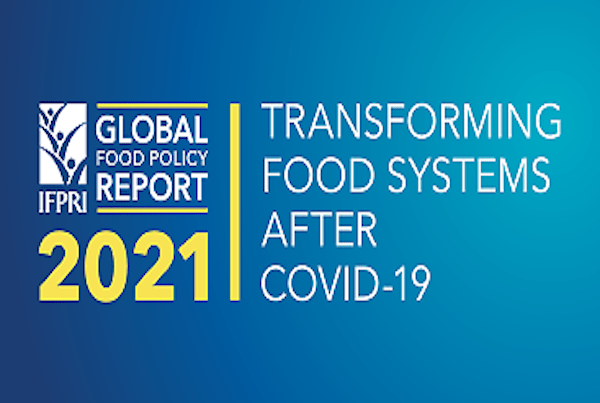The chapters in this flagship report explore key requisites for such a transformation in light of the current shock — balancing health and economic policies, promoting healthy diets and nutrition, strengthening social protection policies and inclusion, integrating natural resource protection into food sector policies, and enhancing the contribution of the private sector — and how best to achieve them. Regional sections examine the diverse experiences of the pandemic worldwide, and the impact of varied response measures.
At the launch event 13/04, speakers will share evidence on the impact of COVID-19, and discuss the way forward for food systems transformation.
Remarks
- Agnes Kalibata, UN Secretary General’s Special Envoy to the 2021 Food Systems Summit
- Marco Ferroni, Chair, CGIAR System Board
- Johan Swinnen, Director General, IFPRI
- John McDermott, Director, CGIAR Research Program on Agriculture for Nutrition and Health (A4NH), IFPRI
- Samuel Benin, Deputy Division Director, Africa Regional Office, IFPRI
- Neha Kumar, Senior Research Fellow, IFPRI
- Valeria Pineiro, Senior Research Coordinator, IFPRI
- Danielle Resnick, Senior Research Fellow, and Theme Leader, Governance, IFPRI
- Shahidur Rashid, Director for South Asia, IFPRI
- Rob Vos, Director of Markets, Trade, and Institutions Division, IFPRI
- Moderator Charlotte Hebebrand, Director of Communications and Public Affairs, IFPRI
Resource
IFPRI (2021). 2021 Global Food Policy Report: Transforming Food Systems after COVID-19.Washington, DC: International Food Policy Research Institute. 124 pp. https://doi.org/10.2499/9780896293991This year’s Global Food Policy Report examines what
we have learned about the deficiencies in current food systems, the changes that are needed for system transformation, and what COVID-19 has taught us.
It offers lessons that can help put the world on the path to food system
transformation for greater resilience, inclusion, efficiency, sustainability, and nutrition. IFPRI’s analytical work during
the pandemic — conducted through both new initiatives and reconfigured ongoing research — illuminates the
impacts of the crisis in numerous countries and considers how policy can best address such shocks while also helping to transform food systems for the future
- Chapter 1 Beyond the Pandemic: Transforming Food Systems after COVID-19
Financing the Transformation to Healthy, Sustainable, and Equitable Food Systems - Chapter 2 Resilience: From Policy Responses to Resilient Policy Systems
- Chapter 3 Nutrition: Transforming Food Systems to Achieve Healthy Diets for All
- Chapter 4 Natural Resources and Environment: Governance for Nature-Positive Food Systems
- Chapter 5 Toward Inclusive Food Systems: Pandemics, Vulnerable Groups, and the Role of Social Protection
- Chapter 6 Food Supply Chains: Business Resilience, Innovation, and Adaptation
Related:
Netherlands Discussion of IFPRI’s 2021 Global Food Policy Report: Transforming Food Systems After COVID-19Opening Remarks
- Paul van de Logt, Head, Food and Nutrition Security, Ministry of Foreign Affairs, Government of the Netherlands
- Johan Swinnen, Director General, IFPRI (Presentation)
- John McDermott, Director, CGIAR Research Program on Agriculture for Nutrition and Health (A4NH), IFPRI (Presentation)
- Neha Kumar, Senior Research Fellow, IFPRI (Presentation)
- Frank van Tongeren, Head of the SMART data and modelling unit, Trade and Agriculture directorate, Organisation for Economic Development and Co-operation (OECD)
- Gerda Verburg, United Nations Assistant Secretary-General & Coordinator of the SUN Movement
- Paul van de Logt, Head, Food and Nutrition Security, Ministry of Foreign Affairs, Government of the Netherlands
- Katarlah Taylor, Events Manager, IFPRI


No comments:
Post a Comment